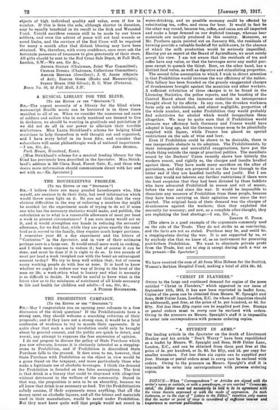THE PROHIBITION CAMPAIGN.
[To THE EDITOR or THE " SPECTATOR:] Ent,—May I congratulate you on opening your columns to a free discussion of the drink question? If the Prohibitionists have a strong case, they should welcome a searching criticism of their proposals; and if they have not a strong case, it would be a fatal confession of weakness to try to muzzle their opponents. It is quite clear that such a social revolution could only be brought about by general consent, and the public are quick to detect, and resent, any attempt to suppress the free expression of opinion.
I do not propose to discuss the policy of State Purchase which you now advocate, because it is obviously intended as a stepping- stone to Prohibition, and if Prohibition is discredited State Purchase falls to the ground. It does seem to me, however, that State Purchase with Prohibition as the object in view would be a gross fraud on the taxpayer, and more particularly those who make a legitimate use of alcoholic beverages. I think the demand for Prohibition is founded on two false assumptions. The first is that drink is a luxury that could be dispensed with altogether without detriment to the welfare of the community. Stated in that way, the proposition is seen to be an absurdity, because we all know that drink is as necessary as food. Yet the Prohibitionists calmly assume, if their arguments mean anything, that all the money spent on alcoholic liquors, and all the labour and materials used in their manufacture, would be saved under Prohibition. But they must know quite well that people would not revert to water-drinking, and no possible economy could be effected by substituting tea, coffee, and cocoa for beer. It would in fact be the other way round, because tea, coffee, and cocoa are all imported and make a large demand on our depleted tonnage, whereas beer materials aro mainly produced in this country. Moreover, as Mr. Prothero again pointed out on January 6th, the residuals of brewing provide a valuable foodstuff for milch-cows, in the absence of which the milk production would be seriously imperilled. Having put an expert at the Board of Agriculture, we must surely accept his view. I am not aware that the residuals of tea and coffee have any value, or that the beverages serve any useful pur- pose except to quench the thirst. Beer, on the other hand, has a distinct food value, as well as digestive and stimulating properties.
The second false assumption to which I wish to direct attention is that Prohibition would increase the war efficiency of the nation. This fallacy has been founded on the grossly exaggerated charges of drunkenness brought against the munition and other workers. A sufficient refutation of those charges is to be found in the Licensing Statistics, the police reports, and the boasting of the Control Board about the immense reduction in intemperance brought about by its efforts. In any case, the drunken workmen form only an infinitesimal, and almost negligible, proportion of the whole number, and under Prohibition they would probably find substitutes for alcohol which would incapacitate them altogether. We may be quite sure that if Prohibition would promote war efficiency both Germany and France would have adopted it long ago, but the German troops seem to be plentifully supplied with liquor, while France has placed no special restrictions on the sale of wine and beer.
Even if Prohibition could be shown to be desirable, there is one insuperable obstacle to its adoption. The Prohibitionists, by their intemperate and untruthful exaggerations, have put the whole thing outside the range of practical politics. The manifesto issued by the Dockers' Union recently shows how bitterly the workers resent, and rightly so, the charges and insults levelled against them. They have made many sacrifices on the altar of patriotism, and they are prepared to see the war through to the bitter end if they are handled tactfully and justly. But I am sure they would not tolerate any further restrictions if there were the least suspicion that they had been dictated by those faddists who have advocated Prohibitiofl in season and out of season, before the war and since the war. It would be impossible to dissociate any measure of Prohibition from these people, because they have been carrying on their agitation ever since the war started. The original basis of their demand was the charges of drunkenness against the workers; then they exploited the necessity for economy; and now, as a complete after-thought, they are exploiting the food shortage.—I am, Sir, &c., EDMUND G. POOLE.
[The above is a good example of the arguments commonly used on the side of the Trade. They do not strike us as convincing, and the facts are not as stated. Purchase may be, and could be. a stepping-stone during the war. It is not supported by us, or by anybody else that we know of, as an instrument for procuring post-bellum Prohibition. We want to eliminate private profit from the Trade, but not to stop it except during such a war as the present.—ED. Spectator.]


































 Previous page
Previous page